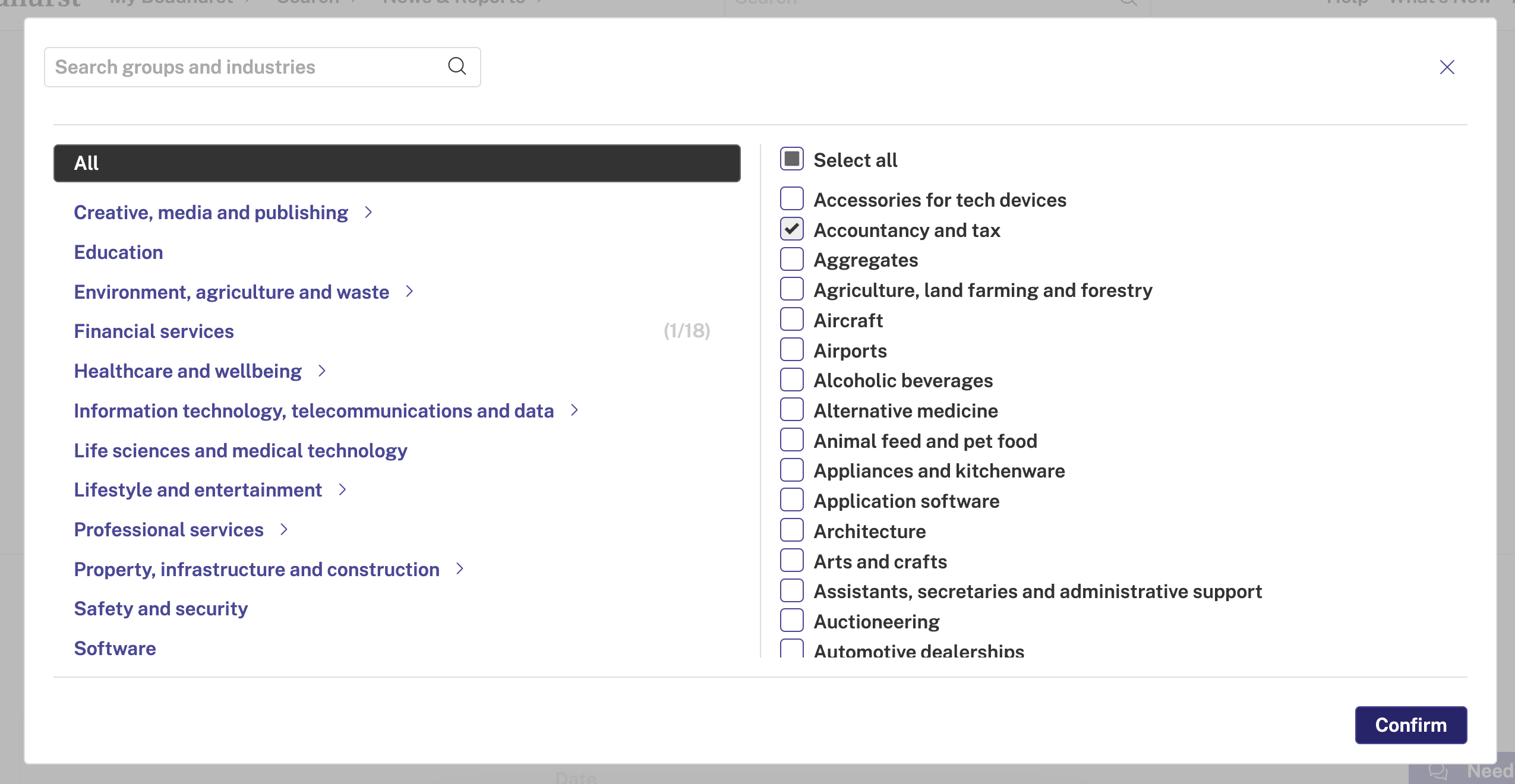
How to Find German Companies
We know that Germany is an exciting business opportunity with a robust ecosystem — one of the economic powerhouses of the world — but it can be tricky to find those opportunities.
Finding reliable, detailed company information, especially when more than just basic data is needed for things such as investment, advisory, or research purposes, isn’t straightforward.
One option is the Handelsregister which can be used for basic, individual company lookups. But if you need data that’s easier to find and more granular, we have a better option.
Beauhurst is a powerful tool for advanced, real-time insights across all companies and industries, giving you access to all the vital information about German and UK companies.
Is there a German equivalent to Companies House?
The Handelsregister is widely seen as the German equivalent of the UK’s Companies House. And while it’s a useful tool, it does have some limitations.
To look up a company on this platform, you only need to enter the company name. But for a more refined search, you’ll need to include one or more of the following details:
- Registered office address
- Legal status
- Registration court
- Type of register
Starting up in Germany
How to search for companies in Germany
Use a specialised data platform (like us)
The quickest and easiest way to search for German companies is to use a data platform that already has all the information you need in one place.
Explore incubators, accelerators, and tech hubs
Cities like Berlin, Munich, and Hamburg are hotspots for tech and innovation and are often referred to as ‘startup hubs’. These can be great places to start when searching for interesting companies — especially if you’re thinking about investment opportunities for your clients.
You can explore accelerators and incubators, such as Factory Berlin or Munich’s UnternehmerTUM, where early-stage companies often get their start. Also, many accelerators host public pitch events where startups present their innovations to potential investors.
Connect with industry networks and events
Germany hosts numerous tech and innovation conferences like Bits & Pretzel and Tech Open Air, where startups showcase their work and investors have the chance to connect.
There’s also organisations like Germany Trade & Invest and the German Chamber of Commerce and Industry that can provide insights into local businesses and market trends but involve continuous monitoring.
Leverage academic partnerships and R&D centres
Germany’s universities and research institutions, like the Fraunhofer Institutes and the Max Planck Institutes, often have startup spin-offs focused on advanced technology, engineering, and biotech. Connecting with these centres can help identify research-driven startups with strong growth potential.
Watch trends in government grants and support programs
Germany has robust support for innovation, especially in sectors like renewable energy, AI, and advanced manufacturing. Monitoring companies receiving public grants or funding through programs like High-Tech Gründerfonds can point to startups working on forward-thinking projects.
But it can be time consuming monitoring numerous funders like this — a platform like Beauhurst automatically tracks those fundraisings for you (but more on that later).
Follow venture capital and angel investment activity
Similarly you can track VC and angel investment activities. Many venture capital firms, such as Earlybird, HV Capital, and Point Nine, have portfolios of German startups. Reviewing their recent investments can help reveal trends and promising companies.
Angel networks like German Angel Investor Network often support early-stage companies and can provide leads on fresh investment opportunities. However this is once again time consuming and resource intensive. At Beauhurst we believe there’s a better way.

How Yeo Ventures uses Beauhurst from deal origination to closure
How to find German companies using Beauhurst
The easiest way to find companies in Germany is to outsource the manual work to a data platform like ours. But how does Beauhurst work in practice? Is it actually as easy as we say? See for yourself.
Setting up your search
Setting up your Beauhurst search couldn’t be easier. You just need to start by adding a few company criteria, such as…
Location
The Beauhurst platform has profiles for every company in the UK and Germany, but for the purpose of this article, we’ll look at German companies only.

From the drop down select ‘German legal entities’ and then you can add which city you’d like to focus on.
Industries and buzzwords
One of the key highlights of using a more extensive data tool like Beauhurst is that you can narrow down your search with filters such as industries.

We have over 600k German companies with an industry, over a huge range of fields from alternative medicine to manufacturing, even fruits, vegetables and fungi.
Company size and stage
If you’re looking for a particular size of company, for example an SME, you can use the Beauhurst filters to narrow down your search even further.
Adding criteria on turnover, fundraising, or number of employees, or the growth rates of these metrics, allow you to find companies of the right size.

Revenue and funding rounds
You might also use this information to understand the company’s growth and predict its future success. Employee metrics can help you find companies that are expanding quickly and our detailed financial filters can indicate a company’s stability — revealing whether this company matches yours or your clients’ desired risk levels.
Check out our YouTube Channel
Enjoyed our video on how to find German companies? Discover tons more data insights on our YouTube channel.
How can I find companies in Germany to invest in?
Filtering by key events and milestones
Tracking business events
Focusing on events such as recent funding rounds, market expansions, mergers, and acquisitions allows you to identify companies that are actively growing and may offer attractive investment opportunities. These events can provide insight into a company’s trajectory, helping you prioritise those with strong growth potential.
Saving and exporting searches
Once you’ve put together your search, you can save these settings for future use to streamline subsequent searches. You can also export this data, making it easy to integrate with your other tools, or simply share insights with colleagues or stakeholders. Exporting data allows you to analyse trends, compare opportunities, and maintain a record of your findings.
What is the best tool for researching companies in Germany?
We believe that Beauhurst is the best tool for researching companies in Germany. Why? Because we have everything you need in one place. Navigating German data is notoriously difficult, until now. And all of this is available with the Beauhurst quality you know and trust.
So, whether you’re a seasoned Beauhurst user or new to our platform, you can now tap into investment opportunities in Europe’s largest economy with our new German dataset. It’s the Beauhurst experience you know and trust—now expanded with a global outlook.
To learn more about the data and see it firsthand, book a meeting with one of our experts.
FAQs
To check if a German company is legitimate, you can verify its registration details in the Handelsregister (German Commercial Register) by searching for the company name or registration number.
The Handelsregister lists official information such as the company’s registered address, legal status, directors, and registration court. You can also consult the Bundesanzeiger (Federal Gazette) for financial statements and other filings, especially for larger companies. Both resources are publicly accessible online and can help confirm the legitimacy of a business.
However, to make this easier, simply use Beauhurst to find all that information in one place. You can also use Beauhurst to check a company’s corporate structure quickly and easily.
To find companies in Germany by industry, you can use a business database like ours, which allows you to filter companies by industry, size, and other criteria.
Otherwise the Handelsregister (German Commercial Register) provides some industry information for registered companies, and platforms like the Bundesanzeiger (Federal Gazette) can offer further details.
For a more targeted search, you can also explore industry associations and directories specific to your sector of interest.
The best way to conduct due diligence on German companies involves the following key steps.
Verify registration and legal status: Check the company’s registration in the Handelsregister (German Commercial Register) to confirm its legal status, registered address, and directors, or use Beauhurst to find the same information more quickly and easily
Review financial statements: Access financial records through Beauhurst or the Bundesanzeiger (Federal Gazette), where larger companies publish annual reports and other filings.
Assess reputation and compliance: Research the company’s reputation by reviewing news articles, customer reviews, and any regulatory records. Industry databases like Beauhurst can also provide risk and compliance insights.
Analyse market and competitor position: Use market research reports or platforms like Beauhurst to understand the company’s position within its industry.
By combining these resources, you can gain a thorough understanding of a German company’s financial health, compliance, and market standing.
Ready to upgrade your approach?
Discover how BeauhurstAdvise can help you impress clients.